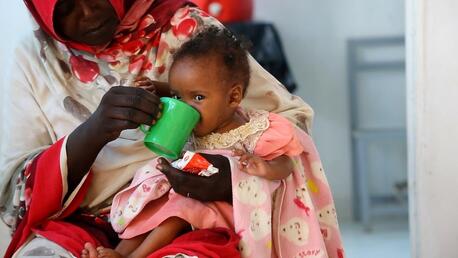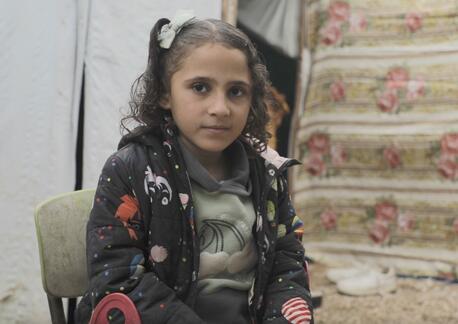
Famine Confirmed in Sudan: UNICEF Calls for Expanded Humanitarian Access
After more than 15 months of a devastating civil war, famine has been officially confirmed in a camp sheltering hundreds of thousands of displaced people in North Darfur, Sudan. UNICEF and partners are delivering critical nutrition supplies and treatment for children, but more help is needed.
Conflict + displacement + restrictions on aid deliveries = famine
A catastrophic combination of conflict, displacement and humanitarian access constraints has resulted in a famine in Zamzam camp in Sudan's North Darfur region, where hundreds of thousands of people have taken shelter after being forced out of their homes by violence.
A determination of famine means that people, including children, have already started dying of hunger and related conditions including malnutrition and infection.
The Famine Review Committee (FRC)’s conclusion that there is famine in Zamzam camp is the first determination of famine by the Committee in more than seven years, and only the third time famine has been confirmed since the monitoring system was created 20 years ago. The FRC warns that other parts of Sudan risk famine if concerted action is not taken.
Unlike the Darfur crisis of 20 years ago, this conflict-fueled hunger crisis spans the entire country including the capital, Khartoum, and Jazirah State, previously Sudan’s most productive agricultural region.
Families in Zamzam camp are struggling to survive without adequate resources
The severe restriction of humanitarian aid is one of the main drivers of the famine conditions in Zamzam. UNICEF was able to deliver enough lifesaving Ready-to-Use Therapeutic Food (RUTF) to treat approximately 4,000 severely acutely malnourished children to El Fasher in July, including an allocation for Zamzam camp, but the continued lack of sustained, safe access means the needs remain huge and continued ability to deliver humanitarian supplies is unpredictable.
Clashes between Sudan's army and the paramilitary Rapid Support Forces (RSF) have pushed waves of families out of their homes, creating the world's largest displacement crisis and leaving 25 million people in need of humanitarian support.
"We left but it was tough going," said Fatima, who fled on foot with her seven children. "There were a lot of bombs, strikes and snipers. And there were a lot of injured people. Children were killed by bombs."
Fatima and her children reached Zamzam camp, where daily life is a struggle. "Since we moved here, we have been facing a lot of difficulties," she said. "There's no food here. Or water. And there are no mattresses or blankets, or clothes for the children. We need a place to stay."
Since we moved here, we have been facing a lot of difficulties. There's no food here. Or water. — Fatima, mother of seven, Zamzam camp
Seven-year-old Retaj's family left El Fasher amid ongoing attacks and reports of horrific violence. "Our situation is bad," she said. "We don't have any money for food and water. At home we would eat three meals: breakfast, lunch and dinner. Here we eat only one meal: breakfast."
"There's not enough food because of the economic hardship families face," Halima, a frontline nutritionist in North Darfur, said in July. "Families don't have enough money to buy different foods. A child may get one meal to eat for a month or two, such as porridge. No fruits or vegetables or anything — that causes malnutrition."
Halima continued: "I do this work to save children's lives. Since the beginning of November, we have not received our wages. There are only four of us here and we work day and night. We provide enriched powdered milk and also a solution for children with diarrhea and vomiting, in addition to routine treatment. We do not have enough cups and jugs. It's painful not having these things. If therapeutic milk and therapeutic food are not available, it will be difficult to treat children."
A fully man-made famine
UNICEF and the UN World Food Program (WFP) have been warning of the escalating risk to the people of Sudan, particularly children, if urgent aid cannot be delivered to communities trapped in conflict hot spots like Darfur, Khartoum, Kordofan and Al Jazirah. The situation remains critical across the whole country, with an estimated 730,000 children projected to suffer severe acute malnutrition (SAM) this year, the most life-threatening form of malnutrition.
“This famine is fully man-made," said UNICEF Executive Director Catherine Russell. "We again call on all the parties to provide the humanitarian system with unimpeded and safe access to children and families in need. We must be able to use all routes, across lines of conflict and borders. Sudan’s children cannot wait. They need protection, basic services and most of all, a ceasefire and peace.”
Learn more about how UNICEF is helping children in Sudan.
More funding is needed to scale up UNICEF's emergency response to Sudan's malnutrition crisis. Please donate today.
HOW TO HELP
There are many ways to make a difference
War, famine, poverty, natural disasters — threats to the world's children keep coming. But UNICEF won't stop working to keep children healthy and safe.
UNICEF works in over 190 countries and territories — more places than any other children's organization. UNICEF has the world's largest humanitarian warehouse and, when disaster strikes, can get supplies almost anywhere within 72 hours. Constantly innovating, always advocating for a better world for children, UNICEF works to ensure that every child can grow up healthy, educated, protected and respected.
Would you like to help give all children the opportunity to reach their full potential? There are many ways to get involved.





